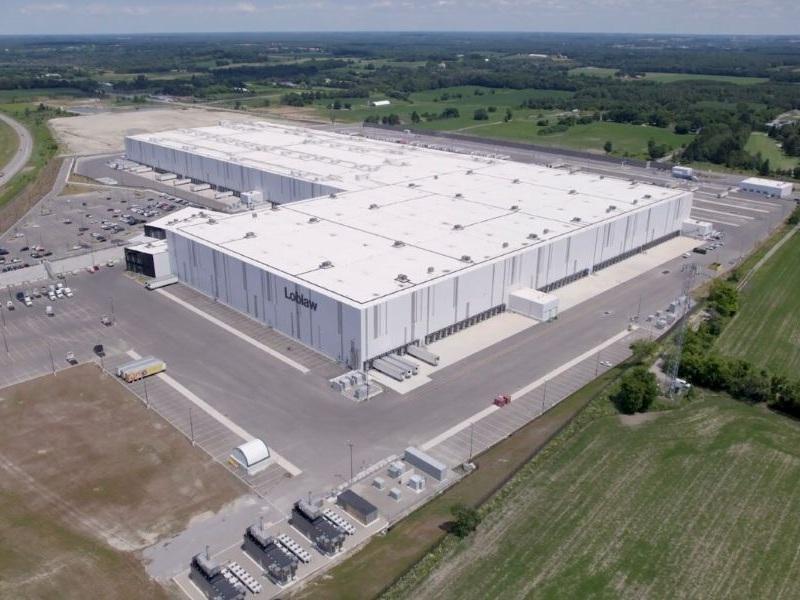
Loblaw Companies Ltd. (L-T) plans to install an approximately 435,000-square-foot rooftop solar system at its East Gwillimbury Distribution Centre in Ontario, which it claims will be the largest of its kind in the country upon completion.
The 7.5-megawatt (MW) system will cover the equivalent of more than seven football fields, generating enough power to cover up to a quarter of the electricity consumed at the facility.
Scheduled to be operational in 2026, the large retailer that operates grocery franchises is partnering with Toronto-based Great Circle Solar, a solar project developer and asset manager, to develop, own and operate the system. Both companies are continuing a partnership that was started in 2012 and now covers over 90 projects at Loblaw facilities and communities across Canada.
"From the moment we began construction on our East Gwillimbury Distribution Centre, we knew we needed to take full advantage of the rooftop space to generate clean, renewable energy for the facility," Tom Marson, vice-president of building technology and energy at Loblaw, said in the announcement.
"This installation clearly demonstrates our commitment to taking decisive action as we work to achieve net-zero Scope 1 and Scope 2 emissions by 2040 for our enterprise operating footprint,” he added.
The rooftop solar project at the East Gwillimbury Distribution Centre will be complemented by other low-carbon elements such as fully-electric shunt trucks and building energy management systems.
Rooftop solar on the rise in Canada
Loblaw engaged with rooftop solar in 2010, announcing four pilots at its stores in Ajax, Orleans, Toronto and Whitby.
The technology has enormous potential for expansion in Canada, a report by Dunsky Energy + Climate Advisors said. The Canadian clean energy research group argues for rooftop solar to be scaled up by 20 to 40 times as part of a renewable energy strategy, raised from its current adoption rate of 0.2 per cent to between two to four per cent.
Oxford Properties made rooftop solar a part of its sustainability efforts, with the systems in place at its shopping malls Square One Shopping Centre in Mississauga, Scarborough Town Centre and Yorkdale Shopping Centre in Toronto.
At Oxford’s James Snow Business Park in Milton, Ont., the real estate investor, developer and property manager included 400,000 square feet of rooftop solar panels for the first phase. Such an amount can generate 3.8 million kilowatt-hours (kW-h) of energy per year, the company said in its latest sustainability report.
Maple Reinders, the construction firm behind James Snow Business Park, said Phase 1 of the rooftop solar systems consists of approximately 8,500 solar panels to form a 4.68 MW system designed to generate 80 per cent of the anticipated electrical demand for future tenants.
Fiera Real Estate Investments Ltd. is another company that put its name in the running for the largest rooftop solar project in Canada. In 2024, the company which is a part of Montreal-headquartered Fiera Capital Corp., unveiled its plan for a 503,000-square-foot industrial property in the Calgary area.
Phase 1 of the project, which is finished, can generate under two million kW-h of electricity per year. A Fiera executive interviewed by Sustainable Biz Canada said it would cover over 113,000 square feet, with Phase 2 spanning a wider area that was undecided at the time of the interview.
Loblaw’s climate efforts
Loblaw has the targets of reaching net-zero by 2040 for its enterprise operations and net-zero by 2050 for its supply chain (Scope 3) emissions.
For its pollution stemming from from sources owned or controlled by Loblaw (Scope 1) and emissions from electricity, steam, heating and cooling purchases (Scope 2), the company calculated a combined 1,056,016 tonnes of carbon dioxide equivalent in financial year 2024. It marks a 16 per cent decline against its 2020 baseline.
The company took steps to reduce its carbon by switching its truck fleet to electric vehicles, making LED lighting and refrigerant conversions at its stores, and incorporating smart controls in its buildings, according to its 2024 sustainability report. In 2023, Loblaw said it would source renewable electricity from TC Energy for its Alberta operations starting this year.
But around 97 per cent of the company’s emissions are Scope 3. As an early step, Loblaw initiated a supplier engagement strategy. As of the end of 2024, approximately 32 per cent of its Scope 3 volume by spend was sourced from suppliers that adhered to science-based targets for the climate. Loblaw has the aim of sourcing 70 per cent of its volume by spend from suppliers that have set science-based targets by 2027.










